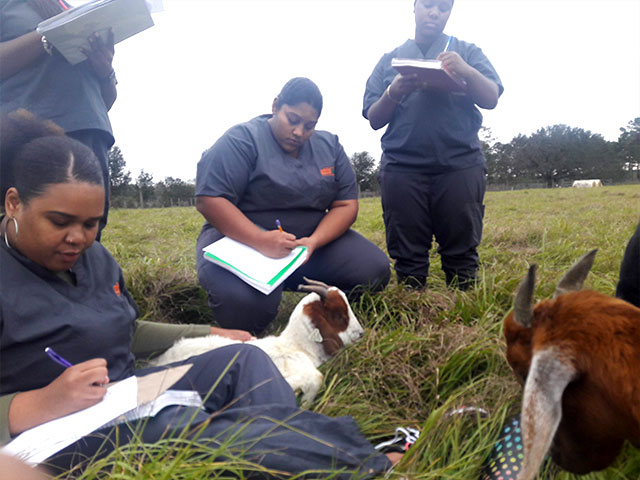Veterinary Technology

The mission of Florida A&M’s Veterinary Technology Program is to train students and inform community-based clientele and extension personnel in the application of sound science-based herd health programs designed to improve health, efficiency and management of food producing animals.
As one of only 23 in the nation that offers a four-year degree in the area of veterinary technology, FAMU’s Vet Tech program stands alone in placing emphasis on regulatory education and training that prepares students to pursue a multitude of careers in the veterinary field. For the first two years, students concentrate on general education, introductory course requirements. At the FAMU Animal Complex in Quincy, Florida, students apply veterinary terms and concepts, and they model ethical and professional behavior under the guidance of FAMU's licensed veterinarians and technologists. The Complex houses equine, small ruminant, and swine species for use in extension, research, and teaching, and it has a kennel unit to house cats and dogs. The program is accredited by the American Veterinary Medical Association, thus graduates can take the national certification examination.
Veterinary Technology Curriculum
Admission Information | Scholarship Information
CONTACT:
Glen Wright, DVM
Program Leader
E-mail: glen.wright@famu.edu vet.tech@famu.edu
Phone: (850) 599-8433
Veterinary Technology
Veterinary Technologists are essential to the art and science of animal health. They provide necessary medical and non-medical support to veterinarians, and have a significant impact in research, biodefense and food safety. The mission of Florida A&M’s Veterinary Technology Program is to train students and inform community-based clientele and extension personnel in the application of sound science-based herd health programs designed to improve health, efficiency and management of food producing animals. Our program is one of only eighteen in the nation to offer a four year degree in the area of Veterinary Technology, and stands alone in placing emphasis on regulatory education and training.
The Animal Science Program (Veterinary Technology Track) is an intensive four-year degree program which trains students to provide medical and non-medical support to veterinarians. During the first two years, students will concentrate on the core Animal Science major requirements. The latter half of the program consists of clinical rotations at the Florida A&M Animal Healthcare Complex in Quincy, Florida. Here students will practically apply veterinary team concepts, and model ethical and professional behavior under the guidance of FAMU’s licensed veterinarians. The complex mirrors the most technologically advanced large animal clinics, and houses small ruminant, swine, and equine species for use in teaching. Upon accreditation, our graduates will be eligible for certification by the Florida Veterinary Medical Association.
Entry into the Animal Science/Veterinary Technology program is only available in the
fall semester. The College of Agriculture and Food Science requires students to have
an overall GPA of 2.0 and a strong background in mathematics and the sciences. Please
refer to the University’s admissions page for more detailed information.
APPLY ONLINE NOW! Please click here.
The program gives students many different experiences in animal science to help them better understand and refine their career paths and the opportunity to apply for early admission to FAMU.
The program targets diverse populations of current 8-11 (rising 9th-12th) grade students from across the country interested in animal science, veterinary medicine, and related fields
FAMU AGDISCOVERY SUMMARY DESCRIPTION
AgDiscovery at Florida A&M University (FAMU) is a two-week summer outreach program. The program targets diverse populations of current 8th-11th (rising 9th-12th) grade students from across the country interested in animal science, veterinary medicine, and related fields. Students gained experiential learning via different delivery approaches through workshops, laboratory and field exercises, and various cultural and teambuilding activities.
The program gives students many different experiences in animal science to help them better understand and refine their career paths and the opportunity to apply for early admission to FAMU.
In an in-person setting, students live on FAMU's campus for the duration of the program free of cost and receive complete safety and security services.
FAMU AgDiscovery is annual and starts on the second Sunday in June and ends in two weeks on a Saturday. For more information about 2022 program information, please click here.
Application:
The application will start in late December 2021, and you may find the application
and related information at the USDA website www.aphis.usda.gov/agdiscovery.
For more information, please contact:
Dr. Carmen Lyttle-Nguessan
Phone:(850) 412-5363
Email: carmen.lyttlenguessa@famu.edu
Dr. Glen Wright
Phone: (850) 599-8433
Email: glen.wright@famu.edu
Veterinary technologists, sometimes called veterinary technicians, work as part of a healthcare team. They are supervised by veterinarians, who diagnose disease and injury, prescribe treatments, and perform surgery on animals. The technologist’s job is to offer skilled, medical assistance to the veterinarian. Veterinary technicians who have earned a bachelor’s degree are given the title of veterinary technologist. They might perform more advanced tests and procedures and are often well placed for jobs in hospital management, scientific research, or work in a complex veterinary specialty, such as herd health or critical care. Most states require veterinary technologists to be licensed before they can work. Requirements vary for licensure; some states usually require technicians to pass the National Veterinary Technician Exam.
FAMU Veterinary Technology Partners with Gadsden County Animal Shelter (video)
http://www.wctv.tv/home/headlines/80949027.html
Veterinary Technology Named Top Recession-Proof Career (video)
http://www.cbsnews.com/video/watch/?id=4817004n
-courtesy of CBS Evening News
Veterinarian - US News and World Report
http://www.usnews.com/money/careers/articles/2009/12/28/veterinarian.html
Watch a Food Supply Veterinarian at Work
http://www.avmatv.org/media.cfm?c=201&m=1005&s=67&
Learn Where There Are Critical Shortages in Food Supply Veterinary Medicine and How
YOU Can Fill Them
http://www.avma.org/fsvm/default.asp- courtesy of the American Veterinary Medical Association
AMERICAN VETERINARY MEDICAL ASSOCIATION
www.avma.org/
NATIONAL ASSOCIATION OF VETERINARY TECHNICIANS IN AMERICA
www.navta.net
FLORIDA VETERINARY TECHNICIAN ASSOCIATION
www.fvta.net/floridaveterinarytechnicianassociation/
UNITED STATES DEPARTMENT OF AGRICULTURE- ANIMAL AND PLANT INSPECTION SERVICE
www.aphis.usda.gov/
THE UNITED STATES ARMY VETERINARY CORP
www.goarmy.com/amedd/vet/index.jsp
www.goarmy.com/JobDetail.do
FLORIDA A&M VETERINARY TECHNOLOGY BRINGS HEALTHCARE
TO GADSDEN COUNTY ANIMAL SHELTER
Watch Us on WCTV-CBS Tallahassee
Read The Story in the Tallahassee Democrat
CBS EVENING NEWS NAMES VETERINARY TECHNOLOGY A "TOP RECESSION-PROOF CAREER"
watch here
EBONY MAGAZINE August 2009
FLORIDA A&M VETERINARY TECHNOLOGY A PROGRAM "WORTH NOTING"
read here
DIVERSE ISSUES IN HIGHER EDUCATION August 20, 2009
FAMU helps "address a critical national shortage of minorities in the field of veterinary
medicine and related disciplines.”
read here
Veterinary technologists are often called animal nurses because they care for animal
patients the way nurses care for humans. But veterinary technologists’ responsibilities
extend beyond nursing, combining duties of many human healthcare jobs. In addition
to providing general nursing, technicians help to administer and monitor anesthesia
just as surgical nurses do, take x-rays and sonograms like radiological technicians,
clean teeth like dental technicians, provide rehabilitation like physical therapy
aides, monitor surgical equipment like surgical technicians, and conduct laboratory
tests like clinical laboratory technicians. Many people are attracted to veterinary
technology because they love animals—and that’s a good foundation for a veterinary
career. But veterinary technologists also need solid scientific skills. As veterinary
medicine becomes more advanced, the duties of technicians are becoming more complex
and varied.
In many cases, a veterinary technologist’s first step in caring for an animal is to
give a general exam by looking for external parasites, anatomical problems, or other
medical issues that should be brought to the veterinarian’s attention. Technologists
need to know what’s considered normal for a wide variety of species and breeds. They
talk to the animal’s owner, asking specific questions to uncover symptoms. In addition,
veterinary technologists provide direct care, administering prescribed medicines or
vaccinations orally or by injection.
Technologists take animals’ temperature, blood pressure, respiration, EKG readings,
and other vital statistics. They collect samples by drawing blood, scraping skin,
or collecting bodily fluids and waste. Bodily fluids are examined through a microscope,
for example, to identify bacteria, toxins, parasites, or nutrient deficiencies, and
tissue cells are cultured and checked for signs of cancer or other abnormalities.
Analyzing test samples is a little like detective work, with technologists looking
for clues about what’s wrong with an animal. Veterinarians rely on the results to
make the right diagnosis.
A veterinary technologists’ work extends to people as well as to animals. Technologists
often spend more time with people and their animals than veterinarians do. They write
after-care instructions for animal owners, calm owners’ fears, and answer questions.
Many supervise other animal-care workers and entry-level technicians and assistants.
Technologists who work at veterinary teaching hospitals show veterinary students how
to insert catheters, give injections, and perform other procedures.
Employment of veterinary technologists is expected to grow 41 percent over the 2006-16
projection period, which is much faster than the average for all occupations. Pet
owners are becoming more affluent and more willing to pay for advanced veterinary
care because many of them consider their pet to be part of the family. This growing
affluence and view of pets will continue to increase the demand for veterinary care.
The vast majority of veterinary technicians work at private clinical practice under
Veterinarians. As the number of Veterinarians grows to meet the demand for veterinary
care, so will the number of veterinary technicians needed to assist them.
Biomedical facilities, diagnostic laboratories, wildlife facilities, humane societies,
animal control facilities, drug or food manufacturing companies, and food safety inspection
facilities will provide additional jobs for veterinary technologists and technicians.
However, keen competition is expected for veterinary technologist and technician jobs
in zoos and aquariums
Veterinary Technology Faculty Profiles

Program Leader
E-mail: glen.wright@famu.edu vet.tech@famu.edu
Phone: (850) 599-8433

Jennifer Mathews, DVM
PhD, The Ohio State University
E-mail: jennifer.mathews@famu.edu
Areas of Interest: Analysis of clinical pathology data from veterinary patients, including complete blood counts, clinical chemistry profiles, urinalyses, and cytological specimens Antimicrobial resistance in nosocomial bacterial pathogens Molecular epidemiology of zoonotic and nosocomial bacterial pathogens

Norman Scarbrough, CVT
B.S., University of Phoenix
Email:norman.scarbrough@famu.edu
Areas of Interest: Veterinary Technology

Julie-Anne Valliant, CVT
Queen's University, BA
Email:julieanne.valliant@famu.edu
Areas of Interest: Fear Free Animal Handling Veterinary Technology Title Protection One Health Initiatives



